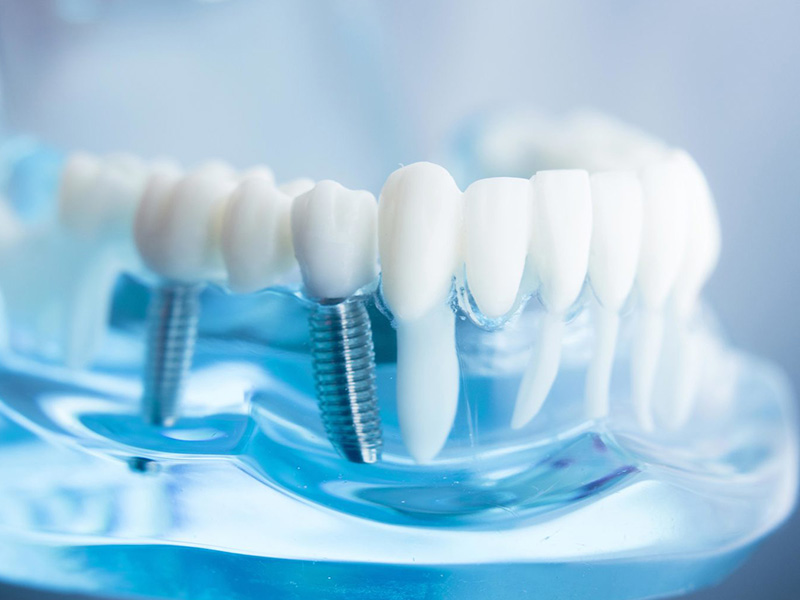What is a dental implant?
What is a dental implant?
A dental implant is a screw-like metal component (typically titanium) embedded in the lower jawbone (jawbone) or upper jawbone (maxilla).
A dental implant consists of 3 main elements:
- An artificial root embedded in the jawbone
- Abutment – attaches to the head of the implant and sits above the gum line (creates a stable platform on which the prosthesis is attached)
- Denture tooth / bridge / partial denture / full denture
The dental implant provides a permanent structure that can support an individual prosthetic crown or several prosthetic teeth in the form of bridges or prostheses. Depending on the type of restoration work performed, multiple prosthetic teeth can be supported with a single dental implant. The dental implant is equipped with a surgical procedure that normally takes less than an hour to complete. A recovery period of 3-6 months is usually observed before a second stage of surgery is performed to fit the prostheses. However, ‘single stage’ or ‘same day’ implants can be offered to patients who meet certain criteria, including adequate general health, adequate oral health and adequate bone density. Most surgical procedures for dental implants are performed under local anesthesia. However, if a patient requires multiple dental implants, the dentist may recommend performing the procedure under IV sedation for the patient’s comfort. Before any dental implant study is performed, the patient must undergo an evaluation. This evaluation will likely include an x-ray and a CBCT scan (digital 3D imaging). Using these results, the dentist will also consider the Occlusal Vertical Dimension (OVD) – the term used to describe anatomical structures, including the space between the upper teeth and lower teeth, the position of the adjacent teeth, bone quality and position. sinus (maxilla) and nerves.
What are the benefits of dental implants?
- Patients can benefit from dental implants in a variety of ways that can be divided into practical benefits and psychological benefits. Practical benefits of dental implants include:
- Enhanced Usability – dental implants offer ‘set and forget’ convenience (unlike removable dentures that need to be removed / replaced daily)
- Increased Levels of Oral Health – when needed, the procedure involves building surrounding bone and soft tissues (stopping and reversing any deterioration)
- Enhanced Speech Distribution – dental implants are embedded in the bone and do not move / slip while speaking (eliminates murmur)
- Improved Chewing (easy to chew) – dental implants are fixed to the bone and will not slide or move while eating
The psychological benefits of dental implants include:
- Enhanced Self-Esteem – dental implants can create a more confident ‘Hollywood’ smile during personal interactions
- Enhanced Visual Appearance – dental implants have a well-cared visual appearance to natural teeth (results in peace of mind as people won’t notice the teeth are prosthetics)
- Enhanced Comfort (compared to alternatives) – dental implants do not agitate the gums (e.g. removable dentures can cause friction issues)
Which materials are used in dental implants?
Although dental implants are increasingly available in various formats. The most common type of dental implant consists of three parts:
- Dental Implant
Screw-like dental implants are typically made using titanium or a titanium alloy, as this material is known to deliver optimum results in terms of integration with bone.
- Abutment Abutment
is more or less fully embedded in the denture and can be made of various materials such as titanium or stainless steel.
- Crown (prosthetic tooth / bridge / prosthesis)
The crown is a visible denture tooth and can be made from a variety of materials including ceramic compounds and porcelain.
In many cases the abutment and crown form a single unit known as screw implants. These are always preferred for patients. However, depending on the implant location, screw implants may not always be possible.
How many prosthetic teeth can be supported with a single implant?
Prosthetic teeth do not necessarily need to be supported by individual dental implants at a ratio of 1: 1.
The dentist will decide whether the jawbone area is a viable implant area based on factors such as bone density and if there is room for prosthetic teeth between existing teeth / implants.
A reasonably healthy adult who is missing a single tooth can expect treatment to involve a single dental implant in which a single prosthetic tooth is inserted (filling the hole left by the missing tooth).
When two or more consecutive teeth are missing, the dentist can choose to place dental implants in the most appropriate jaw areas and wear a bridge or partial denture.
All options will be outlined in a treatment plan (this is the plan laid out by the dentist after all fitness checks have been completed).
Can anyone have a dental implant?
The answer to the question of whether anyone can have a dental implant falls into whether the patient has acceptable levels of general health and oral health. Health and patient safety are key considerations and can be carefully managed. Oral health conditions are equally important. Implant compatibility, general oral hygiene and the number of teeth to be replaced are issues to be considered when determining implant suitability. The first point to mention is that dental implants can only be attached to the bone that has stopped growing or nearly stopped growing. This means that the treatment is only available for adults and generally teenagers over 18. In most cases, braces can also be considered as part of planning to fill an area. Conditions that may affect the body’s natural healing process (such as hemophilia) should also be taken into account. In situations where such health concerns exist, the patient may not be eligible for the dental implant procedure. Also, patients receiving head / neck radiation therapy may experience impaired bone density levels – meaning surgery on bone is not recommended. The dentist will ask all questions regarding the patient’s medical history before recommending and installing dental implants.
DENTAL IMPLANT TYPES
Different types of dental implants have been developed individually to achieve optimum results.
For example, patients with multiple tooth loss and low bone height may not be suitable for an ‘endosteal’ implant and will likely require a specialized ‘subperiosteal’ solution.
What is an endosteal implant? (intraosseous implant)
An endosteal implant is a type of dental implant that is screwed into the upper or lower jaw bone and then grafted or ‘tied’ into the bone for a typical healing period of 3-6 months. This type of dental implant procedure requires sufficient bone density both to place the implant and to provide sufficient bone material around the implant where grafting can occur.
What is a subperiosteal implant? (implant on bone)
A subperiosteal implant consists of a long metallic bone molded to enclose the exposed jawbone. The frame is firmly attached to the jawbone. The gum is sewn into place, hiding the base of the implant – protrusions above the gingival line protruding from the implant. Individual crowns, bridges or dentures can be attached to these posts. This type of procedure is preferred in cases where the patient offers a reduced bone height which serves to reduce the success rate of endosteal implants.
What are transosteal implants? (implant through bone)
A transosteal implant can only be used in the lower jaw (jawbone). This is because the method involves drilling through the jaw. A metal plate is attached to the underside of the chin. Screw-like implants are inserted through holes in the jaw and screwed into the metal plate. The heads of the screws (shown above the gum line in the mouth) can then be used as fixing posts to which a bridge or denture can be attached. Transosteal implants can result in scarring. The method is generally reserved for cases that cannot be resolved with other more common dental implant solutions.
How will I know if I am suitable for dental implants?
The consultation procedure can continue, provided that the adult who wishes to undergo the dental implant procedure can demonstrate adequate levels of both general health and oral health.
An x-ray will be taken from the patient’s mouth and a model will be made of teeth. This will confirm some details of the patient’s dental problems.
Cone Beam Computed Tomography (CBCT) scanning is another diagnostic tool that can be used at this stage.
CBCT scan provides topographic (3D) mouth view. This allows the dentist to measure bone density and exact positioning of teeth and other structures.
In cases where bone density is not sufficient, the dentist may recommend treatments aimed at increasing bone thickness by creating a viable dental implant site.
Conditions such as osteoporosis, diabetes, and hemophilia can cause lower recovery rates. These conditions will be evaluated by the dentist as to whether the chances of success are significantly affected.
Implant Prices in Turkey
Implant Prices in Turkey, particularly in Germany, the Netherlands, France and other European countries are suitable male. health tourism in Turkey has been increasing in recent years too much. Implant Prices Turkey with the decision of the Chamber of Dentists, unfortunately, is not described in the web site.
Dental implants are a modern solution for people who have one or more missing teeth. This is a great way not only to bring back the smile on your face, but also to deal with the problem in the long run. Dental implants are an innovation in medicine. However, you need to rely on an experienced professional to place dental implants to be satisfied with the results. If you have already settled here or come to dental tourism, say goodbye to the old smile and say “Hello!”
Since it is very suitable for Turkish and foreign citizens living abroad compared to the country they live in, it finds an opportunity to carry out holiday and health travel together. You can reach us at our WhatsApp number and get a price to get information according to your needs.
Where is the best clinic for dental implants in Turkey?
MediGoTurkey, the most experienced agency in the placement of dental implants in Turkey. All of our medical professionals share the same understanding. They believe in the power of knowledge about the nature and biology of tissues. This is the only way you can guarantee a result that meets patients’ needs for dental implants. Clinical homeland of Turkey, which is selected from a long list of countries which often specialize in this type of surgery and treatment. Please contact us via WhatsApp for Implant Prices in Turkey.
You can get treatment planning and cost information by sending your jaw x-ray to us via WhatsApp, E-mail or mail with Implant Dental Treatment Appointment. You can contact us on WhatsApp to get information immediately.





